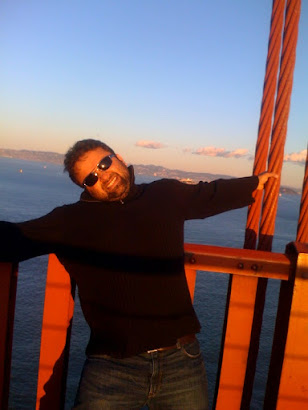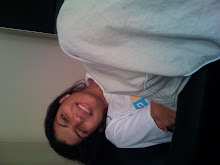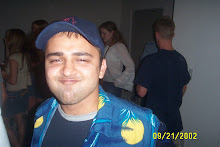This was the science fiction in the good'ol days of Doordarshan.

Yosemite.
Monday, December 17, 2007
Friday, December 14, 2007
Vegetarian? Vegetarian?
"Vegetarian? Is this Vegetarian? Veggie?" a short dark balding man in an oversized leather jacket asks the waitress at a Thai restaurant pointing at a picture in the menu. The lady is used to many Indians coming to her joint because its cheap and close to a major software consulting company. The employees are mainly underpaid FOBs, in the US on a couple years' assignment. Some have been here for many more years but are still just as curious as the FOBs. Many can't afford a car yet so its nice to be able to just walk to the restaurant. A welcome break from the drudgery of boring work and idiotic bosses. Plus Thai food is so much like Indian food; what with the coconuts and the spices. They lady says impatiently "No meat. Order?". She has many customers to attend to. He orders a veggie fried rice.
He waits for his food to arrive and glances at other tables. Some occupied by singletons like himself, others with people in groups, lucky them. He can't seem to recollect even a single time he ate alone in India. A few tables away is a group of four Indian girls talking excitedly and giggling. He tries to catch their eyes. He succeeds with one. He smiles at her. She rolls her eyes and whispers something to the other girls. They all turn around, look at him and break into another giggle. He smiles to himself, thinking, Indian girls are so beautiful and innocent, not like the American ones. Oh wait, he looks closely. There is beer bottle on their table. And, also a pack of Marlboro! Shee, no culture only! Indian girls are very spoilt he concludes.
He overhears a conversation on the table next to him. Two guys, one Desi and the other American, are discussing the recent housing market collapse. The Desi is confident and the loudest most obnoxious person in the restaurant. "THIS IS THE RIGHT TIME TO BUY, IF YOU HAVE A MILLION YOU SHOULD BUY A HOUSE IN CUPERTINO, BEST SCHOOL DISTRICT!". Our man has been hearing about house prices and stock market every place he goes to. It seems all that people talk about here is fucking houses and stocks. Cupertino, he makes a mental note, good school district. But he is not interested in houses for now. He is just struggling to send the monthly payments to his parents in Hyderabad. He takes comfort in knowing that his parents are being taken care of. House, maybe some other day.
His food arrives. Ah, the smell of hot and spicy fried rice. He wants to eat with his fingers but resists the temptation and picks up the spoon instead. While munching he gazes through the window at the street outside. An old Indian lady with a walking stick wearing an old sweater over a punjabi dress and tennis shoes is hobbling down the footpath. The area has a few redneck car dealers. Monster sized trucks and SUVs whiz past the old lady at high speeds. The noise and vibrations emitted by these great American engines make the lady tremble. Our man gets a little concerned. But she'll get used to it, he thinks. After all, when he first got here he regularly walked three miles on the interstate highway to get to the nearest Walmart. He still gets the jitters thinking about the roar of the passing 18-wheeler trucks and their loud angry honks.
The lady comes to a stop at a bus-stop nearby. Two Indian guys are waiting there carrying a few plastic bags filled with grocery items, looking completely out of place. Green vegetables, tortillas, milk, eggs. Waiting for the bus to arrive, wondering who the heck did their grocery in India or for that matter who cleaned their houses or washed their clothes or cooked their food or cleaned their dirty dishes or paid their bills. One guy has forgotten his jacket at home and is now shivering uncontrollably. His partner pays no attention to him and keeps staring blankly in the direction of the arriving bus. A relationship run efficiently, just like a business. He had never imagined that cold could be this devastating to your body and soul. In movies they showed people dancing on snow capped mountains and then lighting a campfire and getting horny and then wham! bam! thank you ma'am! Not like that here.
The bus arrives, the Indian posse gets in. Our man finishes the last grain of fried rice in his plate. He takes a sip of water and rinses his mouth making a little gurgling sound. The loud Desi on the other table hears this and contorts his face displaying mild disgust. Saala desi, he thinks and continues his solo speech "SO THE GOOGLE STOCK IS DOING GOOD. IF YOU HAVE SOME SPARE MONEY YOU SHOULD INVEST IN IT!".
Our man gets out of the restaurant. It has gotten much colder. "Oh bhennnnchod" he screams and sprints towards his office. He thinks of calling his roommate to pick him up from work tonight. Can't walk home in this biting cold. Fucking roommate, counts every penny, even gas for a ride, efficiently running a relationship, like a business.
Samaapt. Dhanayad.
p.s. A hilarious paragraph from Suketu Mehta's book Maximum City, where he talks about his immigrant childhood -
I missed saying bhenchod to people who understood it. It does not mean 'sister fucker'. That is too literal, too crude. It is, rather, punctuation, or emphasis, as innocuous a word as 'shit' or 'damn'. The different countries of India can be identified by the way each pronounces this word - from the Punjabi bhaenchod to the thin Bambaiyya pinchud to the Gujarati bhenchow to the Bhopali elaboration bhen-ka-lowda. Parsis use it all the time, grandmothers, five-year-olds, casually and without any discernible purpose except as filler: 'Here,bhenchod, get me a glass of water.' 'Arre, bhenchod, I went to the bhenchod bank today.'
In my first New York winter, wearing a foam jacket my parents had bought in Bombay which actually dispersed my body heat out to the atmosphere instead of preserving it, and sucking in the freezing winds during my mile-long walk to school and drawing them to my body, I found I could generate warmth by screaming out this word. Walking into the wind and the snowdrifts, my head down, I would roar, 'Bhenchod! Bheyyyyyn-chod!' The walk to school led through quiet Queens residential streets, and the good Irish, Italian, and Polish senior citizens who happened to be home in the daytime much have heard this word on very cold days, screamed out loudly by a small brown boy dressed inappropriately for the weather.
Tuesday, December 11, 2007
Go Bobby Jindal Go !
I just read an article by Shashi Tharoor about Bobby Jindal. I am joining the party late but, what the heck, I'll say it anyway. So Bobby Jindal is now the Governor of The State of Louisiana. The Desi community here and in India are all jumping with joy like teenage cheerleaders. They held prayers before the election. After the elections they celebrated like they just won a lottery. Wow, first Indian American to reach such a high position in the US government. The future sure looks bright for us here. We mastered technology, business, medicine, motels and now politics. America is truly a melting pot. But wait a minute. Do we even know what Bobby Jindal stands for? When little, the boy was named Piyush but he decided to change his name to Bobby, apparently getting inspired to be white after watching a TV show called "The Brady Bunch". He converted to Catholicism and made his wife do it too; they are regular church goers. Nothing against the religion, I've got great Catholic Desi friends, but what would be the reason he would (and make his family) convert? Possibly to appease the white folks? He stands for the Republicans. Nothing against the Republicans (I am one) but considering his parents were immigrants and knowing the hard stand of Republicans against immigration and their inherent xenophobia you would assume that the dude would be a little liberal on things sensitive to the immigrant community. He is anti-abortion, anti-gay (have to validate that), anti-gun control, and what not. All that a typical desi would stand for, Bobby Jindal stands against. The fucker is smart, no doubt about that. He is not obligated to show his Indian-ness but saala he takes money and support from Indians for his campaigns and in his speech to the Indian community he totally flips over and talks about how great the Indian culture is but makes no reference to actual policies for the benefits of immigrants or on any of his hard stands. We are so gullible. Bobby almost screams out that to succeed here you have to change your identity and be like John "Chevrolet" Doe.
Anyway, the full article is published here from TOI as follows.
*********************************************************************************
http://timesofindia.indiatimes.com/Opinion/Columnists/Should_we_be_proud_of_Bobby_Jindal/articleshow/2495846.cms
The election of Bobby Jindal as governor of the US state of Louisiana has been greeted exultantly by Indians and Indian-Americans around the world. There’s no question that this is an extraordinary accomplishment: a young Indian-American, just 36 years old, not merely winning an election but doing so on the first ballot by receiving more votes than his 11 rivals combined, and that too in a state not noticeably friendly to minorities. Bobby Jindal will now be the first Indian-American governor in US history, and the youngest currently serving chief executive of an American state. These are distinctions of which he can legitimately be proud, and it is not surprising that Indians too feel a vicarious sense of shared pride in his remarkable ascent.
But is our pride misplaced? Who is Bobby Jindal and what does he really stand for?
There are, broadly speaking, two kinds of Indian migrants in America: though no sociologist, i’ll call them the atavists and the assimilationists. The atavists hold on to their original identities as much as possible, especially outside the workplace; in speech, dress, food habits, cultural preferences, they are still much more Indian than American. The assimilationists, on the other hand, seek assiduously to merge into the American mainstream; they acquire a new accent along with their visa, and adopt the ways, clothes, diet and recreational preferences of the Americans they see around them. (Of course, there are the in-betweens, but we’ll leave them aside for now.) Class has something to do with which of the two major categories an Indian immigrant falls into; so does age, since the newer generation of Indians, especially those born in America, inevitably tend to gravitate to the latter category.
Bobby Jindal is an assimilationist’s dream. Born to relatively affluent professionals in Louisiana, he rejected his Indian name (Piyush) as a very young child, insisting that he be called Bobby, after a (white) character on the popular TV show ‘The Brady Bunch’. His desire to fit in to the majority-white society he saw around him soon manifested itself in another act of rejection: Bobby spurned the Hindusim into which he was born and, as a teenager, converted to Roman Catholicism, the faith of most white Louisianans. There is, of course, nothing wrong with any of this, and it is a measure of his precocity that his parents did not balk at his wishes despite his extreme youth. The boy was clearly gifted, and he soon had a Rhodes scholarship to prove it. But he was also ambivalent about his identity: he wanted to be seen as a Louisianan, but his mirror told him he was also an Indian. The two of us won something called an ‘Excelsior Award’ once from the
Network of Indian Professionals in the US, and his acceptance speech on the occasion was striking — obligatory references to the Indian values of his parents, but a speech so American in tone and intonation that he mangled the Indian name of his own brother. There was no doubt which half of the hyphen this Indian-American leaned towards.
But there are many ways to be American, and it’s interesting which one Bobby chose. Many Indians born in America have tended to sympathise with other people of colour, identifying their lot with other immigrants, the poor, the underclass. Vinita Gupta, in Oklahoma, another largely white state, won her reputation as a crusading lawyer by taking up the case of illegal immigrants exploited by a factory owner (her story will shortly be depicted by Hollywood, with Halle Berry playing the Indian heroine). Bhairavi Desai leads a taxi drivers’ union; Preeta Bansal, who grew up as the only non-white child in her school in Nebraska, became New York’s Solicitor General and now serves on the Commission for Religious Freedom. None of this for Bobby. Louisiana’s most famous city, New Orleans, was a majority black town, at least until Hurricane Katrina destroyed so many black lives and homes, but there is no record of Bobby identifying himself with the needs or issues of his state’s black people. Instead, he sought, in a state with fewer than 10,000 Indians, not to draw attention to his race by supporting racial causes. Indeed, he went well beyond trying to be non-racial (in a state that harboured notorious racists like the Ku Klux Klansman David Duke); he cultivated the most conservative elements of white Louisiana society. With his widely-advertised piety (he asked his Indian wife, Supriya, to convert as well, and the two are regular churchgoers), Bobby Jindal adopted positions on hot-button issues that place him on the most conservative fringe of the Republican Party. Most Indian-Americans are in favour of gun control, support a woman’s right to choose abortion, advocate immigrants’ rights, and oppose school prayer (for fear that it would marginalise non-Christians). On every one of these issues, Bobby Jindal is on the opposite side. He’s not just conservative; on these questions, he is well to the right of his own party.
That hasn’t stopped him, however, from seeking the support of Indian-Americans. Bobby Jindal has raised a small fortune from them, and when he last ran (unsuccessfully) for governor in 2004, an army of Indian-American volunteers from outside the state turned up to campaign for him. Many seemed unaware of his political views; it was enough for them that he was Indian. At his Indian-American fundraising events, Bobby is careful to downplay his extreme positions and play up his heritage, a heritage that plays little part in his appeal to the Louisiana electorate. Indian-Americans, by and large, accept this as the price of political success in white America: it’s just good to have “someone like us” in such high office, whatever views he professes to get himself there.
So Indians beam proudly at another Indian-American success story to go along with Kalpana Chawla and Sunita Williams, Hargobind Khorana and Subramaniam Chandrasekhar, Kal Penn and Jhumpa Lahiri. But none of these Indian Americans expressed attitudes and beliefs so much at variance with the prevailing values of their community. Let us be proud that a brown-skinned man with an Indian name has achieved what Bobby Jindal has. But let us not make the mistake of thinking that we should be proud of what he stands for.
Sunday, December 9, 2007
Its getting cold out there
To all my east coast and surrounding area friends, I hear its getting ridiculously cold out there. Dirty snow, slippery roads, multi-layered jackets, you haven't showered in ages, holed up in crappy apartments all day long. I've got a song to cheer you up...
When it gets dark and lonely,
and its always freaking cold only.
You are thinking of sunny days,
but God has her funny ways,
The snow outsite climbs in inches,
maa kasam the thandi pinches.
All you crave is chai-garam,
but your spirit is totally naram.
East coast, about its culture, does boast,
chaila, now you are dreaming of the west coast?
Anyhow, I can totally relate to you. Its freaking 75 F here on the west coast today. I am thinking of putting on my shorts and going for a jog. Ah, the good life.
Friday, December 7, 2007
Sunday, December 2, 2007
Subscribe to:
Posts (Atom)








